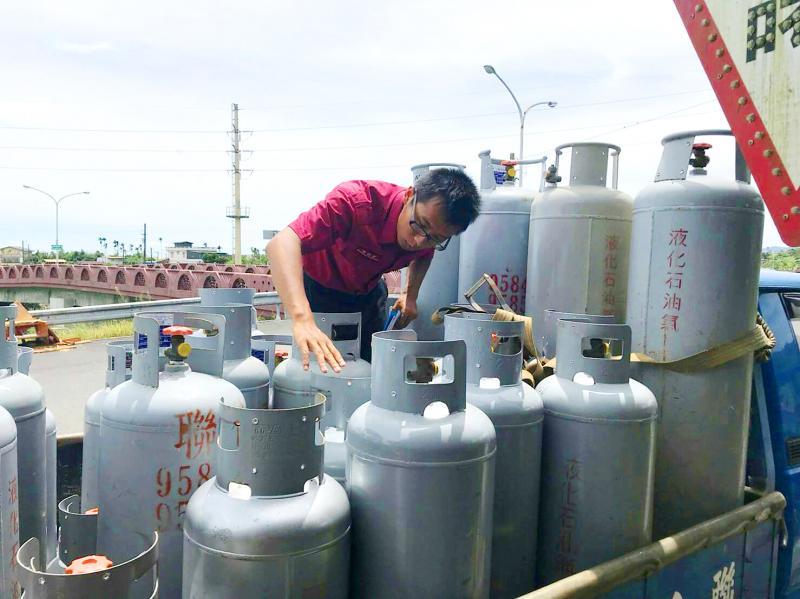Oil prices would increase, affecting the consumer price index (CPI), if the Strait of Hormuz is closed, even though less than 20 percent of Taiwan’s oil and gas imports pass through the strait, Minister of Economic Affairs J.W. Kuo (郭智輝) said today.
Iran has threatened to close the strait in retaliation against US airstrikes on Iranian nuclear facilities.
At a meeting of the legislature's Economics Committee, Chinese Nationalist Party (KMT) Legislator Yang Chiung-ying (楊瓊瓔) asked Kuo how a blockaded Strait of Hormuz would affect Taiwan and whether the Ministry of Economic Affairs has countermeasures in place.

Photo: Chang Yi-cheng, Taipei Times
The ministry has been tracking the issue since last week, made several predictive models and obtained price information from the market, Kuo said.
Although less than 20 percent of Taiwan’s imported oil and gas passes through the strait, there could be ramifications for oil prices, he said.
If the strait were to be closed off, ships would be forced to take longer alternative routes, he said.
Asked if this meant crude oil prices would increase, Kuo said: “Of course.”
However, he added that the ministry would carefully evaluate all of its models and potential strategies.
In response to concerns about the effect of rising oil prices on CPI, a measure of inflation, Kuo said that a 10 percent increase in oil prices would lead to a 0.3 percent increase in CPI.
A 1 percent increase in electricity prices would raise CPI by about 0.027 percent, he added.
Taiwan People's Party Legislator Chang Chi-kai (張啓楷) asked about the conflict’s effect on the stock market and how the ministry would respond after the TAIEX fell 400 points in early trading today.
CPC Corp, Taiwan (CPC, 台灣中油) has put together a series of strategic responses based on crude oil prices increasing by as much as US$130 per barrel, while also taking into account the CPI, Kuo said.
Meanwhile, the Executive Yuan said in a statement that Vice Premier Cheng Li-chiun (鄭麗君) has ordered the Cabinet's price stabilization task force to monitor possible fluctuations in oil prices and consumer goods.

South Korea’s equity benchmark yesterday crossed a new milestone just a month after surpassing the once-unthinkable 5,000 mark as surging global memory demand powers the country’s biggest chipmakers. The KOSPI advanced as much as 2.6 percent to a record 6,123, with Samsung Electronics Co and SK Hynix Inc each gaining more than 2 percent. With the benchmark now up 45 percent this year, South Korea’s stock market capitalization has also moved past France’s, following last month’s overtaking of Germany’s. Long overlooked by foreign funds, despite being undervalued, South Korean stocks have now emerged as clear winners in the global market. The so-called “artificial intelligence

NEW IDENTITY: Known for its software, India has expanded into hardware, with its semiconductor industry growing from US$38bn in 2023 to US$45bn to US$50bn India on Saturday inaugurated its first semiconductor assembly and test facility, a milestone in the government’s push to reduce dependence on foreign chipmakers and stake a claim in a sector dominated by China. Indian Prime Minister Narendra Modi opened US firm Micron Technology Inc’s semiconductor assembly, test and packaging unit in his home state of Gujarat, hailing the “dawn of a new era” for India’s technology ambitions. “When young Indians look back in the future, they will see this decade as the turning point in our tech future,” Modi told the event, which was broadcast on his YouTube channel. The plant would convert

‘SEISMIC SHIFT’: The researcher forecast there would be about 1.1 billion mobile shipments this year, down from 1.26 billion the prior year and erasing years of gains The global smartphone market is expected to contract 12.9 percent this year due to the unprecedented memorychip shortage, marking “a crisis like no other,” researcher International Data Corp (IDC) said. The new forecast, a dramatic revision down from earlier estimates, gives the latest accounting of the ongoing memory crunch that is affecting every corner of the electronics industry. The demand for advanced memory to power artificial intelligence (AI) tasks has drained global supply until well into next year and jeopardizes the business model of many smartphone makers. IDC forecast about 1.1 billion mobile shipments this year, down from 1.26 billion the prior

People stand in a Pokemon store in Tokyo on Thursday. One of the world highest-grossing franchises is celebrated its 30th anniversary yesterday.